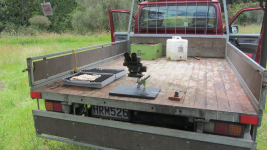Assuming the vaccine actually works, it would be very different to an antibiotic such as terramycin.
The difference would be that if a hive is infected with AFB, then the infection is suppressed with terramycin or some other antibiotic, that will leave a bunch of spores in the hive, and the possibility that AFB will become symptomatic again once the antibiotic is no longer present.
If the vaccine works properly, AFB will not happen in the first place. Or, if the vaccine is only say, 50% effective at preventing a hive getting AFB, then us beekeepers would only get 50% as many cases of AFB.
The beauty of that would be that 50% less infections mean 50% less spreading to other hives and beekeepers. If they also reduced that by 50%, we could be on a downward spiral to zero AFB.
Only my non scientist 2 cent opinion
The difference would be that if a hive is infected with AFB, then the infection is suppressed with terramycin or some other antibiotic, that will leave a bunch of spores in the hive, and the possibility that AFB will become symptomatic again once the antibiotic is no longer present.
If the vaccine works properly, AFB will not happen in the first place. Or, if the vaccine is only say, 50% effective at preventing a hive getting AFB, then us beekeepers would only get 50% as many cases of AFB.
The beauty of that would be that 50% less infections mean 50% less spreading to other hives and beekeepers. If they also reduced that by 50%, we could be on a downward spiral to zero AFB.
Only my non scientist 2 cent opinion
Last edited:



